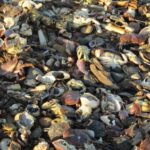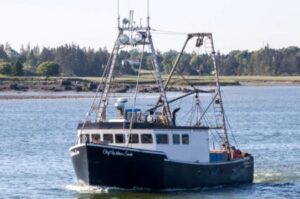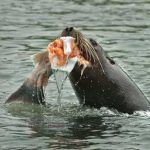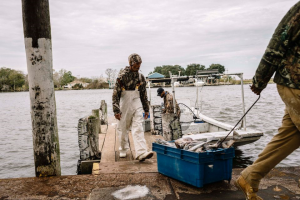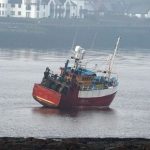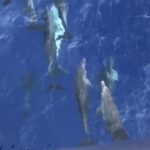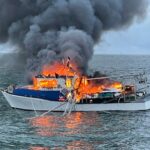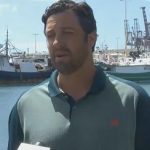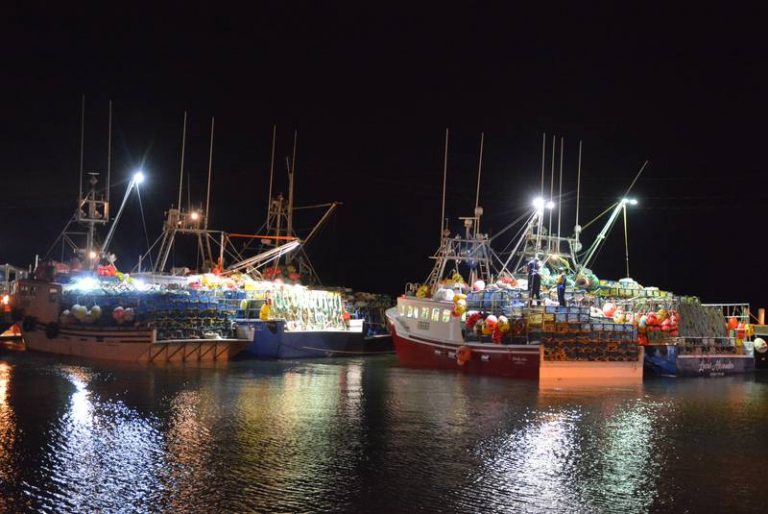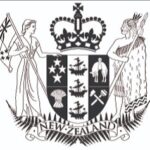Tag Archives: new-england-fishery-management-council
Trying to make a living
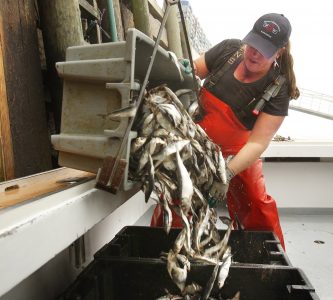 As soon as Old Man Winter indicates he’s loosening his grip on the Maine coast and spring is finally in the air, lobstermen will begin to rig their traps in preparation for the upcoming fishing season. One of their prime concerns this year, as in any year, will be questions about bait supplies and costs. Like other businessmen, how much money lobstermen take home at the end of the day, and what their annual profits will be, depends upon their costs and the price per pound their lobsters bring at the dock. In addition to any boat payments they may have, and for some fishermen with newer boats, these are high, they’ll be eyeing current fuel and bait costs.,, continue reading the op-ed here 10:32
As soon as Old Man Winter indicates he’s loosening his grip on the Maine coast and spring is finally in the air, lobstermen will begin to rig their traps in preparation for the upcoming fishing season. One of their prime concerns this year, as in any year, will be questions about bait supplies and costs. Like other businessmen, how much money lobstermen take home at the end of the day, and what their annual profits will be, depends upon their costs and the price per pound their lobsters bring at the dock. In addition to any boat payments they may have, and for some fishermen with newer boats, these are high, they’ll be eyeing current fuel and bait costs.,, continue reading the op-ed here 10:32
Small-boat scallop fishermen worry about being overwhelmed by larger boats in the Gulf of Maine
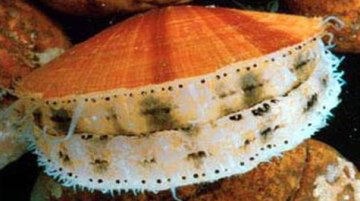 Since the start of the scallop season this month, Jim Wotton has dragged heavy dredges along the seabed off Gloucester, hauling in as much as 200 pounds a day of the valuable clams, the area’s federal limit for small-boat fishermen. Now, to his dismay, dozens of larger, industrial-sized boats have been steaming into the same gray waters, scooping up as many scallops as they can. Unlike their smaller counterparts, the large vessels have no quota on the amount they can catch; they’re only limited by the number of days they can fish.,, NOAA officials acknowledge the fishermen’s concerns, but have declined to take emergency action to close the fishery.,, Representatives of the larger boats say they have every right to fish in the area, and insist their catch won’t threaten the fishery.,, “The situation this year can’t continue and support a strong fishery year in and year out in the Gulf of Maine,” said Pete Christopher, a supervisory fishery policy analyst at NOAA Fisheries. “The council needs to change the way the fishery operates.” read the story here 18:52
Since the start of the scallop season this month, Jim Wotton has dragged heavy dredges along the seabed off Gloucester, hauling in as much as 200 pounds a day of the valuable clams, the area’s federal limit for small-boat fishermen. Now, to his dismay, dozens of larger, industrial-sized boats have been steaming into the same gray waters, scooping up as many scallops as they can. Unlike their smaller counterparts, the large vessels have no quota on the amount they can catch; they’re only limited by the number of days they can fish.,, NOAA officials acknowledge the fishermen’s concerns, but have declined to take emergency action to close the fishery.,, Representatives of the larger boats say they have every right to fish in the area, and insist their catch won’t threaten the fishery.,, “The situation this year can’t continue and support a strong fishery year in and year out in the Gulf of Maine,” said Pete Christopher, a supervisory fishery policy analyst at NOAA Fisheries. “The council needs to change the way the fishery operates.” read the story here 18:52
Out-of-state scallop boats threaten survival of Maine fishermen
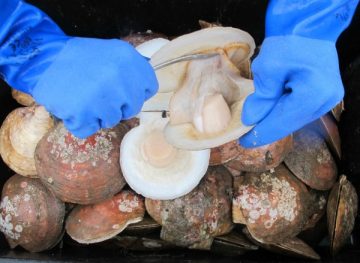 After years of waiting for the northern Gulf of Maine scallop population to flourish, small-boat fishermen from Maine say federal mismanagement of scallop stocks in the area could result in larger boats wiping them out. Hancock fisherman James West said that larger boats, most of which are based out of state, should not be allowed unlimited catches when he is capped at harvesting only 200 pounds of meat a day. And he said he’s angry that the New England Fishery Management Council has known about the regulatory disparity for years and has done nothing to address it. “That’s what makes me so mad about it,” West said Sunday. “I’m shocked the council couldn’t figure out a way to fix this. We’re really getting the shaft.” Council officials say protecting the lucrative resource is a high priority that they plan to address in the coming year. But Maine fishermen say a year could be too late to ensure that federal scallop grounds in the gulf stay productive. continue reading the story here 07:36
After years of waiting for the northern Gulf of Maine scallop population to flourish, small-boat fishermen from Maine say federal mismanagement of scallop stocks in the area could result in larger boats wiping them out. Hancock fisherman James West said that larger boats, most of which are based out of state, should not be allowed unlimited catches when he is capped at harvesting only 200 pounds of meat a day. And he said he’s angry that the New England Fishery Management Council has known about the regulatory disparity for years and has done nothing to address it. “That’s what makes me so mad about it,” West said Sunday. “I’m shocked the council couldn’t figure out a way to fix this. We’re really getting the shaft.” Council officials say protecting the lucrative resource is a high priority that they plan to address in the coming year. But Maine fishermen say a year could be too late to ensure that federal scallop grounds in the gulf stay productive. continue reading the story here 07:36
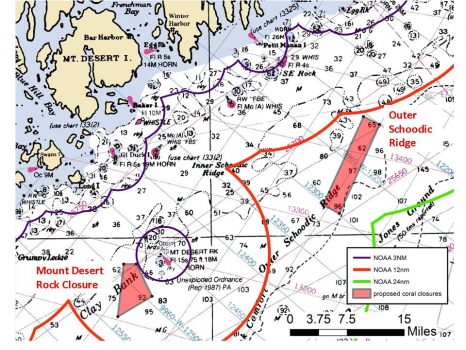
Potential coral protection rules could have big impact on Downeast lobstermen
The New England Fishery Management Council has put rules to protect deep sea corals on the fast track, rules that will have a major impact on lobstermen — primarily from zones A and B with some from Zone C — who set their gear around Mount Desert Rock and Outer Schoodic Ridge. The council is considering management measures to reduce impacts to corals from commercial fishing activities in three areas in the Gulf of Maine. One of the proposals would impose a total ban on fishing in the protected areas which, according to an analysis the Department of Marine Resources submitted to the council several months ago, are located in waters that produce about one-third of Maine’s lobster landings in terms of value. Now DMR is asking lobstermen who fish in the potentially closed areas for information that will help the department in its efforts to prevent the fishing bans. continue reading the article here 08:38
ITS HUGE! Grey Sole limits nearly doubled as scientists use ’empirical approach’ to set new specifications
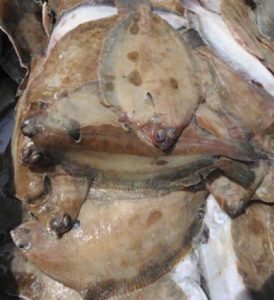 Meeting in Portsmouth, New Hampshire, the New England Fishery Management Council approved an acceptable biological catch of 878 metric tons of witch flounder, also known as grey sole, for 2017. When adjusted for management uncertainty, the move will result in a 2017 annual catch limit of 839 metric tons — nearly twice the 2016 annual catch limit of 441 metric tons. The unanimous vote by the council also underscored the escalating distrust commercial groundfishermen reserve for the science NOAA Fisheries uses to fuel its stock assessments. In December, NOAA Fisheries scientists were forced to concede that the model being used to develop the witch flounder stock assessment was irretrievably flawed after it failed the peer review phase of the process. Read the story here 07:51
Meeting in Portsmouth, New Hampshire, the New England Fishery Management Council approved an acceptable biological catch of 878 metric tons of witch flounder, also known as grey sole, for 2017. When adjusted for management uncertainty, the move will result in a 2017 annual catch limit of 839 metric tons — nearly twice the 2016 annual catch limit of 441 metric tons. The unanimous vote by the council also underscored the escalating distrust commercial groundfishermen reserve for the science NOAA Fisheries uses to fuel its stock assessments. In December, NOAA Fisheries scientists were forced to concede that the model being used to develop the witch flounder stock assessment was irretrievably flawed after it failed the peer review phase of the process. Read the story here 07:51
New England Fishery Management Council meeting in Portsmouth January 24 thru 26, 2017
 The New England Fishery Management Council will be meeting in Portsmouth N.H. at the Sheraton Harborside. To read the final agenda, click here Register click here to listen live via webinar. 12:06
The New England Fishery Management Council will be meeting in Portsmouth N.H. at the Sheraton Harborside. To read the final agenda, click here Register click here to listen live via webinar. 12:06
Coral plan threatens fishing grounds
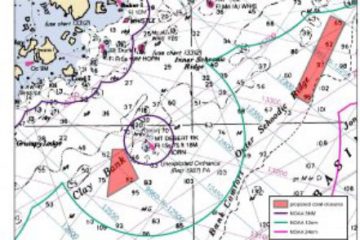 The NEFMC is working with the Mid-Atlantic Fishery Management Council and the South Atlantic Fishery Management Council to preserve deep-sea corals from the Canadian border to Virginia. Area lobstermen could lose valuable fishing grounds if a federal proposal to close four areas of Gulf of Maine waters comes to fruition. The New England Fishery Management Council (NEFMC) has drafted a plan that would close a span of 161 square miles offshore to commercial fishing in an effort to conserve deep-sea coral there. Two of those areas, Mount Desert Rock in Lobster Management Zone B and Outer Schoodic Ridge in Lobster Management Zone A, are preferred fishing grounds for local fishermen when lobster head further offshore in the winter. The other proposed offshore closure areas lie in Jordan Basin and Lindenkohl Knoll to the south. Read the story here 09:34
The NEFMC is working with the Mid-Atlantic Fishery Management Council and the South Atlantic Fishery Management Council to preserve deep-sea corals from the Canadian border to Virginia. Area lobstermen could lose valuable fishing grounds if a federal proposal to close four areas of Gulf of Maine waters comes to fruition. The New England Fishery Management Council (NEFMC) has drafted a plan that would close a span of 161 square miles offshore to commercial fishing in an effort to conserve deep-sea coral there. Two of those areas, Mount Desert Rock in Lobster Management Zone B and Outer Schoodic Ridge in Lobster Management Zone A, are preferred fishing grounds for local fishermen when lobster head further offshore in the winter. The other proposed offshore closure areas lie in Jordan Basin and Lindenkohl Knoll to the south. Read the story here 09:34
Atlantic Halibut under Council scrutiny as Maine’s catch increases
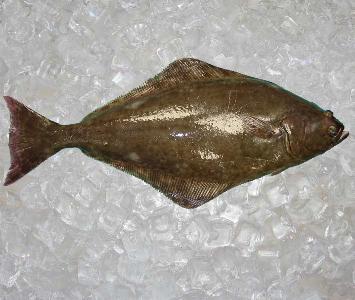 Federal fishing regulators say they are looking to change the way they manage Atlantic halibut in the wake of a surge in catch of the fish. The government lists Atlantic halibut as “overfished” and conservationists want to protect it. But many fishermen say the catch is up because the stock has been rebuilt over recent years. East Coast fishermen caught more than 215,000 pounds of Atlantic halibut in 2015 in the most productive year of fishing for the flatfish since 1972. Catch of the fish in nearshore Maine waters is helping drive the increase, regulators say. The regulatory New England Fishery Management Council decided last month to review management of halibut, which is popular with diners and chefs for its thick, meaty steaks. Exactly what form regulation changes could take isn’t yet known. We’ve identified that this is an issue, and this will be a priority for 2017,” Janice Plante, a spokeswoman for the council, said. Read the story here 08:35
Federal fishing regulators say they are looking to change the way they manage Atlantic halibut in the wake of a surge in catch of the fish. The government lists Atlantic halibut as “overfished” and conservationists want to protect it. But many fishermen say the catch is up because the stock has been rebuilt over recent years. East Coast fishermen caught more than 215,000 pounds of Atlantic halibut in 2015 in the most productive year of fishing for the flatfish since 1972. Catch of the fish in nearshore Maine waters is helping drive the increase, regulators say. The regulatory New England Fishery Management Council decided last month to review management of halibut, which is popular with diners and chefs for its thick, meaty steaks. Exactly what form regulation changes could take isn’t yet known. We’ve identified that this is an issue, and this will be a priority for 2017,” Janice Plante, a spokeswoman for the council, said. Read the story here 08:35
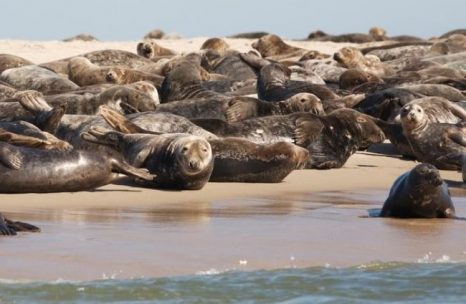
Cape Cod: Summing up the seals
When David Pierce seated himself at the table at the Nantucket Seal Symposium last month, one image came to mind: private pilot Aaron Knight’s video from last April showing miles of gray seals – a dozen deep, cheek by jowl, banding the Monomoy shoreline. Recently appointed as director of the state Division of Marine Fisheries, Pierce is a veteran of decades of fisheries negotiations as former director Paul Diodati’s proxy on the New England Fishery Management Council. Fishery managers live and die by population estimates, known as stock assessments, that help set sustainable catch levels for commercial fishermen, so it was disconcerting to hear that the same level of science had not been applied to the predators who eat them. “The determination of population size is extremely important, especially in the context of ecosystem management in New England,” Pierce said. “If they (gray seals) are out there in large numbers foraging, what might their impact be on the Georges Bank ecosystem?” The answer will not be coming any time soon, according to federal fisheries officials at the symposium. Read the story here 09:43
East Coast fishermen file appeal over cost of government-required ‘at-sea monitors’
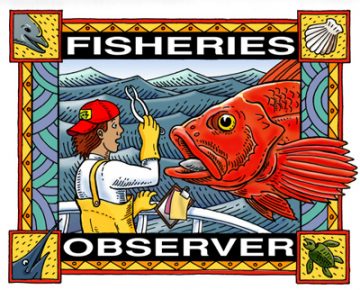 The National Oceanic and Atmospheric Administration, NOAA, requires groundfishermen — those who catch cod, haddock and other common bottom-dwelling species — to carry on board “at-sea monitors.” The observers, hired by three for-profit companies, are third-party workers whose task it is to observe fishermen’s compliance with federal regulations and ensure annual quotas are not exceeded. The dispute lies in the cost of the monitors and who should pay for them: Fishermen are billed on average $700 a day when a regulator is present. NOAA, meanwhile, says monitors were placed on fishing boats like Goethel’s only 14 percent of the time in 2016 — and claims the fishing industry supported this system of regulation in 2010 when a vote went before the New England Fishery Management Council, an advisory board to NOAA that sets the rules. “At sea monitors were originally supported by the sectors when we went from a days-at-sea form of management to a quota based form of management in 2010,” said John Bullard, the regional administrator for NOAA’s Greater Atlantic Regional Fisheries Office. Read the story here 14:22
The National Oceanic and Atmospheric Administration, NOAA, requires groundfishermen — those who catch cod, haddock and other common bottom-dwelling species — to carry on board “at-sea monitors.” The observers, hired by three for-profit companies, are third-party workers whose task it is to observe fishermen’s compliance with federal regulations and ensure annual quotas are not exceeded. The dispute lies in the cost of the monitors and who should pay for them: Fishermen are billed on average $700 a day when a regulator is present. NOAA, meanwhile, says monitors were placed on fishing boats like Goethel’s only 14 percent of the time in 2016 — and claims the fishing industry supported this system of regulation in 2010 when a vote went before the New England Fishery Management Council, an advisory board to NOAA that sets the rules. “At sea monitors were originally supported by the sectors when we went from a days-at-sea form of management to a quota based form of management in 2010,” said John Bullard, the regional administrator for NOAA’s Greater Atlantic Regional Fisheries Office. Read the story here 14:22
Atlantic Herring MSE Workshop – Dec. 7-8 Live Streaming Information
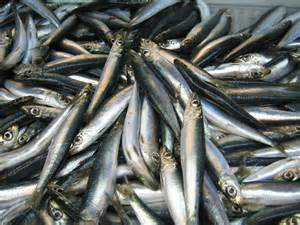 Dear Interested Parties, Please note that registration for the New England Fishery Management Council’s Dec. 7-8 Atlantic Herring Acceptable Biological Catch (ABC) Control Rule Management Strategy Evaluation (MSE) Workshop is closed. We are at room capacity at the meeting venue. However, the Council is inviting anyone who wants to listen to the general workshop presentations to participate via webinar or telephone. Small-group break-out discussions will not be broadcasted through the webinar. Here are the details. Location: Sheraton Harborside Hotel, 250 Market Street, Portsmouth, NH 03810. Time-9:00 a.m. Online access to the meeting will be available. Click here for access. To listen by telephone, dial+1(526)247 8422. The access code is 257-927-141. The agenda, a workshop overview, and all meeting materials are available on the Council’s website at Atlantic Herring MSE Workshop. 10:11
Dear Interested Parties, Please note that registration for the New England Fishery Management Council’s Dec. 7-8 Atlantic Herring Acceptable Biological Catch (ABC) Control Rule Management Strategy Evaluation (MSE) Workshop is closed. We are at room capacity at the meeting venue. However, the Council is inviting anyone who wants to listen to the general workshop presentations to participate via webinar or telephone. Small-group break-out discussions will not be broadcasted through the webinar. Here are the details. Location: Sheraton Harborside Hotel, 250 Market Street, Portsmouth, NH 03810. Time-9:00 a.m. Online access to the meeting will be available. Click here for access. To listen by telephone, dial+1(526)247 8422. The access code is 257-927-141. The agenda, a workshop overview, and all meeting materials are available on the Council’s website at Atlantic Herring MSE Workshop. 10:11
Effort to protect deep-sea coral has lobster industry on alert
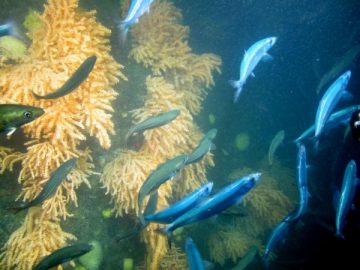 Over 400 Maine lobstermen could lose their traditional fishing territory under a proposal to protect deep-sea corals in the Gulf of Maine. The New England Fishery Management Council is considering a plan that would ban fishing in four designated coral zones spanning about 161 miles of federal waters in the Gulf of Maine – Mount Desert Rock, Outer Schoodic Ridge, Jordan Basin and Lindenkohl Knoll. Here, often on steep rock walls deep under water where sunlight cannot penetrate, scientists have found dense, delicate and slow-growing coral gardens of sea whips, fans and pens. During the cold-weather months, when 52-year-old Jim Dow usually fishes for hard-shell lobsters in deep federal waters, his buoys will encircle Mount Desert Rock, where the lobster is so plentiful that boats will sail for hours to drop traps there. As a result, fishermen call it the Meeting Grounds. He said word is just starting to spread about the coral protection plan, but he said the fishermen he has talked with say they didn’t even know there was coral in the deep canyons below. Read the rest here 10:16
Over 400 Maine lobstermen could lose their traditional fishing territory under a proposal to protect deep-sea corals in the Gulf of Maine. The New England Fishery Management Council is considering a plan that would ban fishing in four designated coral zones spanning about 161 miles of federal waters in the Gulf of Maine – Mount Desert Rock, Outer Schoodic Ridge, Jordan Basin and Lindenkohl Knoll. Here, often on steep rock walls deep under water where sunlight cannot penetrate, scientists have found dense, delicate and slow-growing coral gardens of sea whips, fans and pens. During the cold-weather months, when 52-year-old Jim Dow usually fishes for hard-shell lobsters in deep federal waters, his buoys will encircle Mount Desert Rock, where the lobster is so plentiful that boats will sail for hours to drop traps there. As a result, fishermen call it the Meeting Grounds. He said word is just starting to spread about the coral protection plan, but he said the fishermen he has talked with say they didn’t even know there was coral in the deep canyons below. Read the rest here 10:16
Scallop fishermen will be able to catch more next year
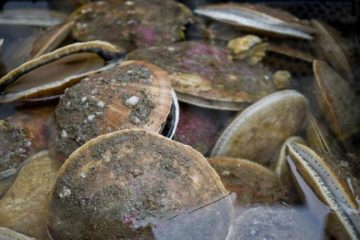 The New England Fishery Management Council approved rules on Wednesday that are expected to yield about 47 million pounds of scallops during the fishing year that begins in spring 2017. The decision is expected to allow fishermen to continue catching more scallops than they did just a few years ago. “We’re happy. It’s a valuable fishery right now,” said Jimmy Wotton, a Maine scallop fisherman. “People are starting to recognize it’s a top quality product, and they are willing to pay for it.” Fishermen are expected to land the extra scallops in an era when price to consumers is increasing and scallops are growing in popularity. Regulators are also allowing fishermen slightly more access to limited scallop fishing areas next year. Read the story here 17:44
The New England Fishery Management Council approved rules on Wednesday that are expected to yield about 47 million pounds of scallops during the fishing year that begins in spring 2017. The decision is expected to allow fishermen to continue catching more scallops than they did just a few years ago. “We’re happy. It’s a valuable fishery right now,” said Jimmy Wotton, a Maine scallop fisherman. “People are starting to recognize it’s a top quality product, and they are willing to pay for it.” Fishermen are expected to land the extra scallops in an era when price to consumers is increasing and scallops are growing in popularity. Regulators are also allowing fishermen slightly more access to limited scallop fishing areas next year. Read the story here 17:44
New England Fishery Management Council meeting in Newport, RI November 15-17, 2016 – Listen Live
 The New England Fishery Management Council will be meeting in at the Hotel Viking, Newport, RI November 15, 2016 – November 17, 2016 . To read the final agenda, click here Register here to listen live via webinar. click here They will send you an email notification. www.nefmc.org 19:15
The New England Fishery Management Council will be meeting in at the Hotel Viking, Newport, RI November 15, 2016 – November 17, 2016 . To read the final agenda, click here Register here to listen live via webinar. click here They will send you an email notification. www.nefmc.org 19:15
Cause of Action Institute sues NOAA For New England Fishery Management Council information on member selection
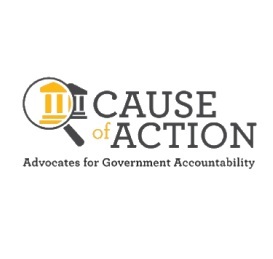 In its July 13 FOIA request, Cause of Action sought information on how the Secretary of Commerce and NOAA select members in the New England Fishery Management Council, which regulates fishing off the coasts of Maine, New Hampshire, Massachusetts, Rhode Island and Connecticut. “The records at issue in this case, which include records of communication between high-ranking agency officials, will permit the public to understand how the most recent round of membership selection for the NEFMC was handled, and whether that process was at all tinged by political considerations or other untoward government action,” the complaint states. Cause of Action claims that NOAA has never disclosed information about how it selects members of the eight regional regulatory councils operating under the Magnuson-Stevens Fishery Conservation and Management Act, and that the membership might not accurately represent the fishing industry. Read the rest here 10:44
In its July 13 FOIA request, Cause of Action sought information on how the Secretary of Commerce and NOAA select members in the New England Fishery Management Council, which regulates fishing off the coasts of Maine, New Hampshire, Massachusetts, Rhode Island and Connecticut. “The records at issue in this case, which include records of communication between high-ranking agency officials, will permit the public to understand how the most recent round of membership selection for the NEFMC was handled, and whether that process was at all tinged by political considerations or other untoward government action,” the complaint states. Cause of Action claims that NOAA has never disclosed information about how it selects members of the eight regional regulatory councils operating under the Magnuson-Stevens Fishery Conservation and Management Act, and that the membership might not accurately represent the fishing industry. Read the rest here 10:44
New England Fishery Management Council meeting in Danvers, MA September 20 – 22, 2016
 The New England Fishery Management Council will be meeting in Danvers, Ma. at the Double Tree by Hilton. To read the final agenda, click here Register here to listen live via webinar. click here They will send you an email notification. www.nefmc.org 15:47
The New England Fishery Management Council will be meeting in Danvers, Ma. at the Double Tree by Hilton. To read the final agenda, click here Register here to listen live via webinar. click here They will send you an email notification. www.nefmc.org 15:47
New England Fishery Management Council Report
 The Council Report summarizes major actions approved at NEFMC meetings or highlights items of interest. At its June21-23 meeting in Portland, ME, the Council approved actions related to the development of its fishery management plans. The issues involved: Sea Scallop FW 28 and the RSA Program, Small Mesh Multisp., Amendment 22. Industry-Funded Monitoring Amendment, Atlantic Herring Amendment 8 Groundfish FW 56 and the haddock catch cap for herring midwatertrawl gear, and Other Items of Interest Read the report here 07:06
The Council Report summarizes major actions approved at NEFMC meetings or highlights items of interest. At its June21-23 meeting in Portland, ME, the Council approved actions related to the development of its fishery management plans. The issues involved: Sea Scallop FW 28 and the RSA Program, Small Mesh Multisp., Amendment 22. Industry-Funded Monitoring Amendment, Atlantic Herring Amendment 8 Groundfish FW 56 and the haddock catch cap for herring midwatertrawl gear, and Other Items of Interest Read the report here 07:06
New England Fishery Management Council meeting in Portland, ME June 21- 23, 2016
 The New England Fishery Management Council will be meeting in Portland, Me. at Holiday Inn by the Bay, 88 Spring Street, Portland, ME 0410. To read the final agenda, click here Listen live via webinar. click here http://www.nefmc.org/ 18:23
The New England Fishery Management Council will be meeting in Portland, Me. at Holiday Inn by the Bay, 88 Spring Street, Portland, ME 0410. To read the final agenda, click here Listen live via webinar. click here http://www.nefmc.org/ 18:23
Small Boat Fishermen Worry New Rules Won’t Come in Time to Save N. Atlantic Scallops
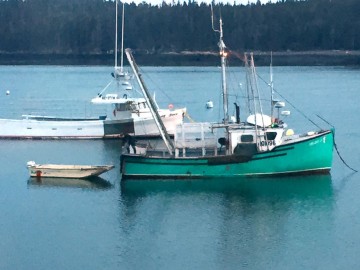 A quandary over scallop rules has two groups of fishermen in Maine at odds over the increasingly lucrative shellfish. Kristan Porter, is an independent fisherman who catches lobsters for most of the year with his boat “Brandon Jay.” But for additional income, for five months each year, he and the two other men on his boat have begun collecting scallops. Eric Hansen, of New Bedford, Massachusetts, is one of the permit holders that aren’t bound by the same quota that Porter and others follow. Hansen, who typically fishes south of Maine, returned to the Gulf of Maine this year for the first time in decades. His family business obtained one of the permits back in 1994 for free that now could be sold for millions of dollars. Read the rest here 08:41
A quandary over scallop rules has two groups of fishermen in Maine at odds over the increasingly lucrative shellfish. Kristan Porter, is an independent fisherman who catches lobsters for most of the year with his boat “Brandon Jay.” But for additional income, for five months each year, he and the two other men on his boat have begun collecting scallops. Eric Hansen, of New Bedford, Massachusetts, is one of the permit holders that aren’t bound by the same quota that Porter and others follow. Hansen, who typically fishes south of Maine, returned to the Gulf of Maine this year for the first time in decades. His family business obtained one of the permits back in 1994 for free that now could be sold for millions of dollars. Read the rest here 08:41
Scallop fishermen poised for fight over shellfish, fishermen and regulators to meet Wednesday
Scallop fishing has increased dramatically off some parts of New England recently, and 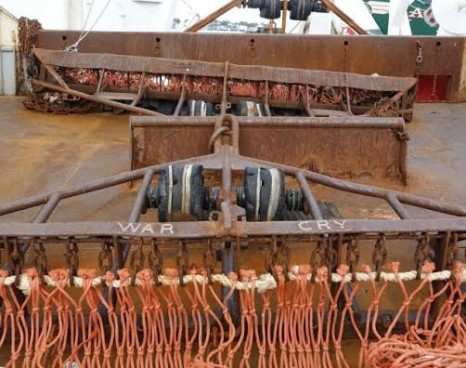 will soon meet to discuss how to avoid overexploiting the valuable shellfish. The concern over scallop fishing centers on the northern Gulf of Maine, a management area that stretches roughly from the waters off of Boston to the Canadian border. Scallop grounds off of northern Massachusetts have been especially fertile, prompting increased fishing in that area. The New England Fishery Management Council, a regulatory arm of the federal government, will hold a public meeting about the issue Wednesday (links here)and decide how to proceed. Alex Todd, a Maine-based fisherman who fishes off of Gloucester, Massachusetts, said he and others feel the rules are not equal. Read the rest here 11:46
will soon meet to discuss how to avoid overexploiting the valuable shellfish. The concern over scallop fishing centers on the northern Gulf of Maine, a management area that stretches roughly from the waters off of Boston to the Canadian border. Scallop grounds off of northern Massachusetts have been especially fertile, prompting increased fishing in that area. The New England Fishery Management Council, a regulatory arm of the federal government, will hold a public meeting about the issue Wednesday (links here)and decide how to proceed. Alex Todd, a Maine-based fisherman who fishes off of Gloucester, Massachusetts, said he and others feel the rules are not equal. Read the rest here 11:46
New England Fishery Management Council meeting in Mystic, CT, April 19-21, 2016 – Listen Live!
 The public is invited to listen in to the New England Fishery Management Council’s April 19-21, 2016 Council meeting. This meeting is scheduled to begin on Tues., April 19 at 9:00 a.m. at the Hilton Mystic, 20 Coogan Ave., Mystic, CT . On Wed. and Thurs. the meeting will start at 8:30 a.m. To view the Final Council Meeting Agenda, Click here To register to Listen Live, Click here 12:16
The public is invited to listen in to the New England Fishery Management Council’s April 19-21, 2016 Council meeting. This meeting is scheduled to begin on Tues., April 19 at 9:00 a.m. at the Hilton Mystic, 20 Coogan Ave., Mystic, CT . On Wed. and Thurs. the meeting will start at 8:30 a.m. To view the Final Council Meeting Agenda, Click here To register to Listen Live, Click here 12:16
CCCFA Small-boat fishermen seek to protect fishery
 Ron Smolowitz accuses small-boat scallopers of “gaming the system” to access the Nantucket Lightship fishing area (“Working the system makes the system unworkable,” My View, April 2). As Smolowitz knows, in December New England Fishery Management Council scientists sent a memo saying there weren’t any conservation concerns with limited fishing there. The proposed access was so small it wouldn’t make sense for Smolowitz’s big-boat fishermen, catching 17,000 pounds per trip, to fish there. But small-boat fishermen can catch only 600 pounds a day, so the proposed access gives us 500 trips — which makes a huge difference for our families and community. Read the rest here 09:27
Ron Smolowitz accuses small-boat scallopers of “gaming the system” to access the Nantucket Lightship fishing area (“Working the system makes the system unworkable,” My View, April 2). As Smolowitz knows, in December New England Fishery Management Council scientists sent a memo saying there weren’t any conservation concerns with limited fishing there. The proposed access was so small it wouldn’t make sense for Smolowitz’s big-boat fishermen, catching 17,000 pounds per trip, to fish there. But small-boat fishermen can catch only 600 pounds a day, so the proposed access gives us 500 trips — which makes a huge difference for our families and community. Read the rest here 09:27
Working the system makes the system unworkable, by Ronald Smolowitz
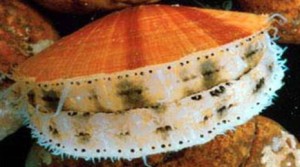 As the owner of Coonamessett Farm in Falmouth and a partner at the Woods Hole Oyster Co., I spend as much time navigating regulatory hurdles as I do tending the farm or going to sea. Many farmers and fishermen have similar fights with overbearing bureaucracy, something likely to become more common as the noose of government regulations tightens.,,Things aren’t much better out at sea. I do a substantial amount of research for the scallop industry, and sustainability is the key reason scallop management is a continued successes. Through a system of rotational management, certain zones are fished while others are left off-limits to allow them to repopulate. Much as with farmland, this system allows the resources to remain sustainable. Read the article, Click here 09:47
As the owner of Coonamessett Farm in Falmouth and a partner at the Woods Hole Oyster Co., I spend as much time navigating regulatory hurdles as I do tending the farm or going to sea. Many farmers and fishermen have similar fights with overbearing bureaucracy, something likely to become more common as the noose of government regulations tightens.,,Things aren’t much better out at sea. I do a substantial amount of research for the scallop industry, and sustainability is the key reason scallop management is a continued successes. Through a system of rotational management, certain zones are fished while others are left off-limits to allow them to repopulate. Much as with farmland, this system allows the resources to remain sustainable. Read the article, Click here 09:47
New England Fishermen face devastating cod cuts
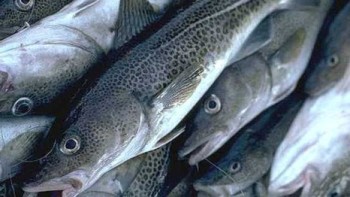 New Bedford’s commercial fishing industry — battered by last month’s arrest of magnate Carlos Rafael on federal conspiracy charges, last week’s drug raids on the waterfront and ongoing monitoring costs — took another punch to the gut this week, as government regulators proposed new cuts to cod catches that could take effect May 1. “Those cuts will be devastating to the groundfishing fleet of New Bedford, and the whole New England coast,” said John Haran, manager of groundfish Sector 13. The National Oceanic and Atmospheric Administration (NOAA), in conjunction with the New England Fishery Management Council, released a proposed update Monday to the federal management plan for the northeastern fishery. Read the rest here 20:45
New Bedford’s commercial fishing industry — battered by last month’s arrest of magnate Carlos Rafael on federal conspiracy charges, last week’s drug raids on the waterfront and ongoing monitoring costs — took another punch to the gut this week, as government regulators proposed new cuts to cod catches that could take effect May 1. “Those cuts will be devastating to the groundfishing fleet of New Bedford, and the whole New England coast,” said John Haran, manager of groundfish Sector 13. The National Oceanic and Atmospheric Administration (NOAA), in conjunction with the New England Fishery Management Council, released a proposed update Monday to the federal management plan for the northeastern fishery. Read the rest here 20:45
Rep. Bill Straus — Impact of the federal fisheries arrests in New Bedford
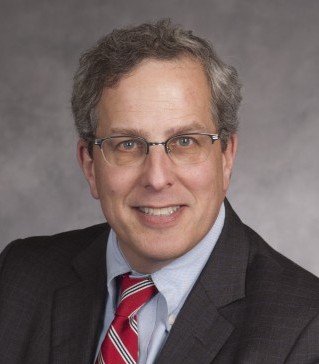 By now the local reaction to the waterfront arrests in New Bedford of one of the port’s major figures has begun to shift to inevitable questions of the role of the federal government in the regulation of commercial fishing. Operating under federal law, the current groundfish system of control, the so-called “catch shares” plan, began with Amendment 16 in 2009 by vote of the New England Fishery Management Council. This intricate system of allocating by fish species what can be caught and landed by licensed federal permit holders has clearly changed the market economics for New England fishing; a rapid concentration of fish permit holders has led to what functions as a government-created near monopoly. Read the rest here 07:43
By now the local reaction to the waterfront arrests in New Bedford of one of the port’s major figures has begun to shift to inevitable questions of the role of the federal government in the regulation of commercial fishing. Operating under federal law, the current groundfish system of control, the so-called “catch shares” plan, began with Amendment 16 in 2009 by vote of the New England Fishery Management Council. This intricate system of allocating by fish species what can be caught and landed by licensed federal permit holders has clearly changed the market economics for New England fishing; a rapid concentration of fish permit holders has led to what functions as a government-created near monopoly. Read the rest here 07:43
Letter: Scallop regulators threaten fishery by opening Nantucket Lightship – Eddie Welch
 A recent controversial decision to open select scallop grounds off the coast of New England to certain select fishing groups undermines , and threatens the future health of one of the region’s most valuable resources. On Dec. 3, the New England Fishery Management Council allotted one component of the fishing fleet 300,000 pounds of scallops for harvest from an area of the Atlantic known as Nantucket Lightship. Proposed by council member and Cape Cod Commercial Fishermen’s Alliance CEO John Pappalardo, this allotment would open Nantucket Lightship too early, and goes against the principles that have made scallop management so successful. Read the letter here 07:59 (photo cred gulfseafoodnews.com)
A recent controversial decision to open select scallop grounds off the coast of New England to certain select fishing groups undermines , and threatens the future health of one of the region’s most valuable resources. On Dec. 3, the New England Fishery Management Council allotted one component of the fishing fleet 300,000 pounds of scallops for harvest from an area of the Atlantic known as Nantucket Lightship. Proposed by council member and Cape Cod Commercial Fishermen’s Alliance CEO John Pappalardo, this allotment would open Nantucket Lightship too early, and goes against the principles that have made scallop management so successful. Read the letter here 07:59 (photo cred gulfseafoodnews.com)
Why is the NMFS calling the New Hampshire obligatory NEFMC seat vacated?
 The state of New Hampshire has been notified by the National Marine Fisheries Service of vacancies for New Hampshire’s obligatory seat and two at-large seats for the New England Fishery Management Council. New Hampshire’s obligatory seat is held by Ellen Goethel, who is completing her first term as a council member. Read the article/notice here. The process of filling council seats requires the governor of each New England state to submit the names of at least three candidates to the U.S. Secretary of Commerce for consideration. The state of New Hampshire uses a public process to recommend individuals for the governor to consider for submission. 22:30
The state of New Hampshire has been notified by the National Marine Fisheries Service of vacancies for New Hampshire’s obligatory seat and two at-large seats for the New England Fishery Management Council. New Hampshire’s obligatory seat is held by Ellen Goethel, who is completing her first term as a council member. Read the article/notice here. The process of filling council seats requires the governor of each New England state to submit the names of at least three candidates to the U.S. Secretary of Commerce for consideration. The state of New Hampshire uses a public process to recommend individuals for the governor to consider for submission. 22:30
NEFMC Newsletter – Council Report
 Dear Interested Parties: You will find attached the New England Fishery Management Council’s newsletter, the Council Report. It summarizes the actions taken at the Council’s meeting in Portsmouth, NH last week. Click here -> NEFMC Council Rept_Jan2016.pdf .Also, please feel free to contact me with any questions and have a nice weekend. Patricia M. Fiorelli, Public Affairs Officer, New England Fishery Management Council (w) 978.465.0492, ext. 106 (c) 617.548.5786 [email protected] 16:45
Dear Interested Parties: You will find attached the New England Fishery Management Council’s newsletter, the Council Report. It summarizes the actions taken at the Council’s meeting in Portsmouth, NH last week. Click here -> NEFMC Council Rept_Jan2016.pdf .Also, please feel free to contact me with any questions and have a nice weekend. Patricia M. Fiorelli, Public Affairs Officer, New England Fishery Management Council (w) 978.465.0492, ext. 106 (c) 617.548.5786 [email protected] 16:45
Fishing industry fighting cost of at-sea monitors
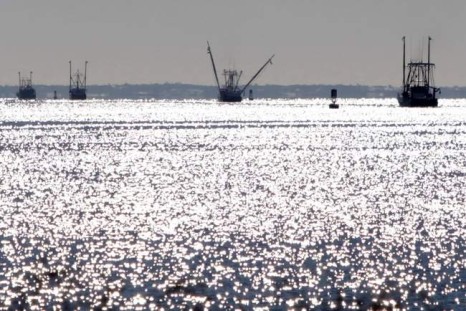 Fishermen are opposing new catch-monitoring costs that could take effect March 1, as a judge’s ruling this week gave the industry a setback in efforts to block the transition from government funding. John Haran of Dartmouth, manager of a local fishery sector, said in December that transferring the regulatory costs to the fishing industry could put more than 40 local groundfishing boats out of business. Local fishing industry tycoon Carlos Rafael said the costs — potentially about $700 per monitored trip — could mean repeated expenses of $14,000 across 20 groundfishing boats in his fleet. Read the article here 07:50
Fishermen are opposing new catch-monitoring costs that could take effect March 1, as a judge’s ruling this week gave the industry a setback in efforts to block the transition from government funding. John Haran of Dartmouth, manager of a local fishery sector, said in December that transferring the regulatory costs to the fishing industry could put more than 40 local groundfishing boats out of business. Local fishing industry tycoon Carlos Rafael said the costs — potentially about $700 per monitored trip — could mean repeated expenses of $14,000 across 20 groundfishing boats in his fleet. Read the article here 07:50
New England Fishery Management Council meeting in Portsmouth, NH January 26 thru 28, 2016
The New England Fishery Management Council and its advisory bodies will meet at the Sheraton Harborside Hotel, 250 Market Street, Portsmouth, NH January 26 thru 28, 2016 . View the Final Council Meeting Agenda, Click here Register to Listen Live, Click here 16:20
































